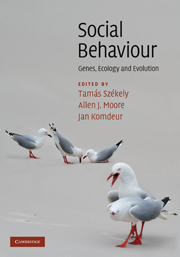Book contents
- Frontmatter
- Contents
- List of contributors
- Introduction: The uphill climb of sociobiology: towards a new synthesis
- Profile: Undiminished passion
- Part I Foundations
- Part II Themes
- 7 Aggression: towards an integration of gene, brain and behaviour
- Profile: From behavioural observations, to genes, to evolution
- 8 Social influences on communication signals: from honesty to exploitation
- Profile: Reputation can make the world go round – or why we are sometimes social
- 9 Important topics in group living
- Profile: A haphazard career
- 10 Sexual behaviour: conflict, cooperation and coevolution
- Profile: In celebration of questions, past, present and future
- 11 Pair bonds and parental behaviour
- Profile: Mating systems and genetic variation
- 12 Adaptations and constraints in the evolution of delayed dispersal: implications for cooperation
- Profile: Selections from a life in social selection
- 13 Social behaviour in microorganisms
- Profile: The de novo evolution of cooperation: an unlikely event
- 14 Social environments, social tactics and their fitness consequences in complex mammalian societies
- Profile: Evolutionary genetics and social behaviour: changed perspectives on sexual coevolution
- 15 Social behaviour in humans
- Profile: Genes and social behaviour: from gene to genome to 1000 genomes
- Part III Implications
- Species index
- Subject index
- References
7 - Aggression: towards an integration of gene, brain and behaviour
Published online by Cambridge University Press: 05 June 2012
- Frontmatter
- Contents
- List of contributors
- Introduction: The uphill climb of sociobiology: towards a new synthesis
- Profile: Undiminished passion
- Part I Foundations
- Part II Themes
- 7 Aggression: towards an integration of gene, brain and behaviour
- Profile: From behavioural observations, to genes, to evolution
- 8 Social influences on communication signals: from honesty to exploitation
- Profile: Reputation can make the world go round – or why we are sometimes social
- 9 Important topics in group living
- Profile: A haphazard career
- 10 Sexual behaviour: conflict, cooperation and coevolution
- Profile: In celebration of questions, past, present and future
- 11 Pair bonds and parental behaviour
- Profile: Mating systems and genetic variation
- 12 Adaptations and constraints in the evolution of delayed dispersal: implications for cooperation
- Profile: Selections from a life in social selection
- 13 Social behaviour in microorganisms
- Profile: The de novo evolution of cooperation: an unlikely event
- 14 Social environments, social tactics and their fitness consequences in complex mammalian societies
- Profile: Evolutionary genetics and social behaviour: changed perspectives on sexual coevolution
- 15 Social behaviour in humans
- Profile: Genes and social behaviour: from gene to genome to 1000 genomes
- Part III Implications
- Species index
- Subject index
- References
Summary
Overview
Aggression ranks among the most misunderstood concepts in the behavioural sciences. Commonly viewed as an aberrant form of behaviour, situations of conflict are pictured in the context of unfavourable or stressful circumstances, brought about by amoral urges, in critical need of our cognitive control, and with negative consequences for all involved. Such a view fundamentally misunderstands the biological significance of all behaviours that occur in the context of attack, defence or threat. Deeply routed in the demands of the natural world, the ability to assert oneself represents a critical solution to any individual's need for self-preservation, defence of its interests or resource competition. Examples of aggression are found throughout the entire animal kingdom, regardless of its bearer's specific neural or cognitive faculties, phylogenetic origins or sociobiological circumstances. It has become abundantly clear that aggressive traits have been shaped by evolution like any other behavioural phenotypes, and a range of underlying mechanisms in the causation of aggression are now being unravelled.
This chapter aims to present a comprehensive overview of the issues that are encountered when trying to understand the hows and whys as individuals oppose each other. The chapter focuses special attention on delineating distinct behavioural phenomena such as aggressive tendencies, dominance or violence. Game-theoretical considerations offer a powerful theoretical framework to assess the evolutionary consequences of different behavioural strategies. A discussion of proximate mechanisms attempts to link these behavioural heterogeneities to the functioning of underlying neural and endocrine control systems.
Information
- Type
- Chapter
- Information
- Social BehaviourGenes, Ecology and Evolution, pp. 165 - 180Publisher: Cambridge University PressPrint publication year: 2010
References
Accessibility standard: Unknown
Why this information is here
This section outlines the accessibility features of this content - including support for screen readers, full keyboard navigation and high-contrast display options. This may not be relevant for you.Accessibility Information
- 7
- Cited by
